Unit 3 Could you please tell me where the restrooms are? Section B2a-2d课件(共26张PPT)2023-2024学年人教版英语九年
文档属性
| 名称 | Unit 3 Could you please tell me where the restrooms are? Section B2a-2d课件(共26张PPT)2023-2024学年人教版英语九年 | 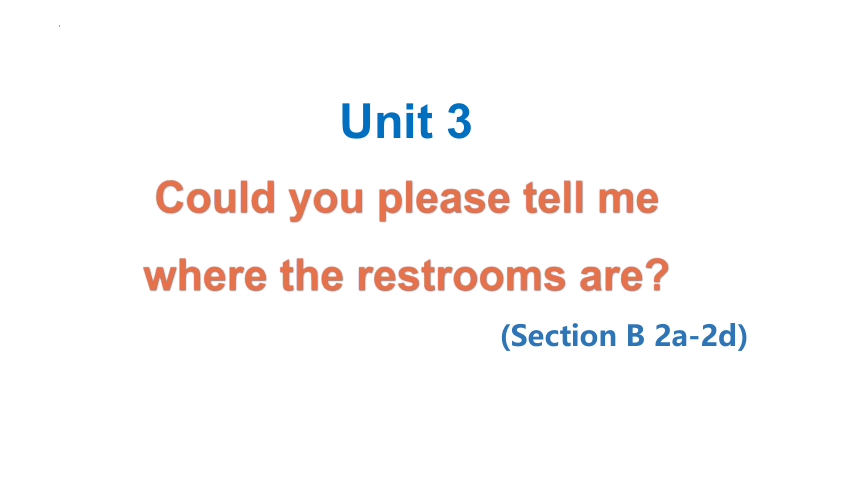 | |
| 格式 | pptx | ||
| 文件大小 | 1.4MB | ||
| 资源类型 | 教案 | ||
| 版本资源 | 人教新目标(Go for it)版 | ||
| 科目 | 英语 | ||
| 更新时间 | 2023-09-24 09:42:09 | ||
图片预览

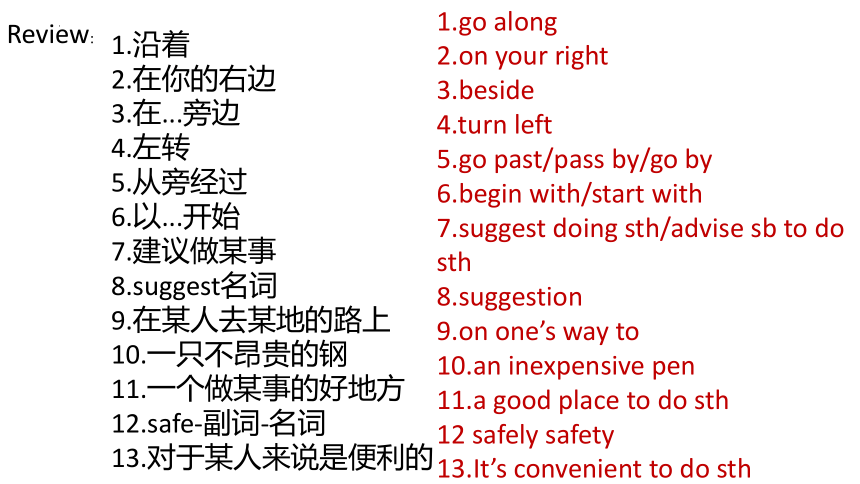
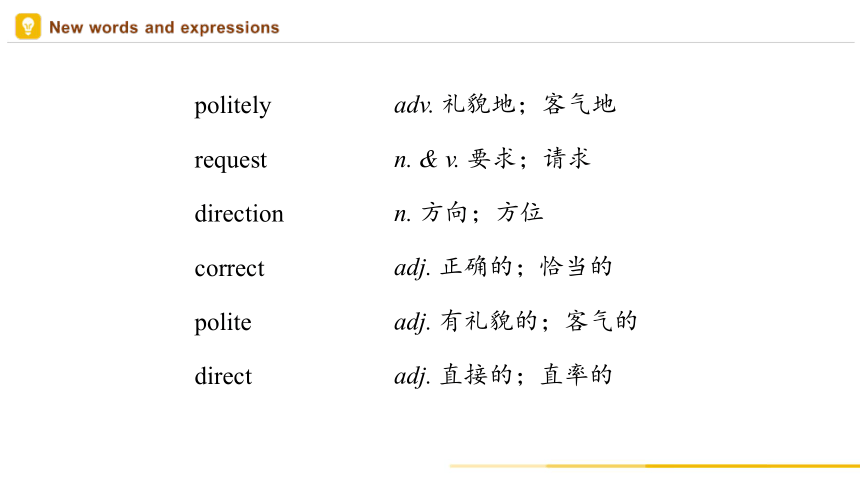
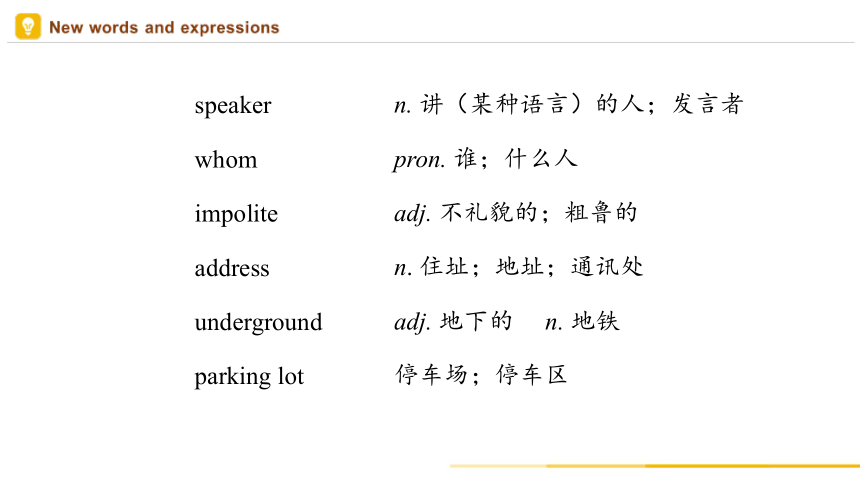
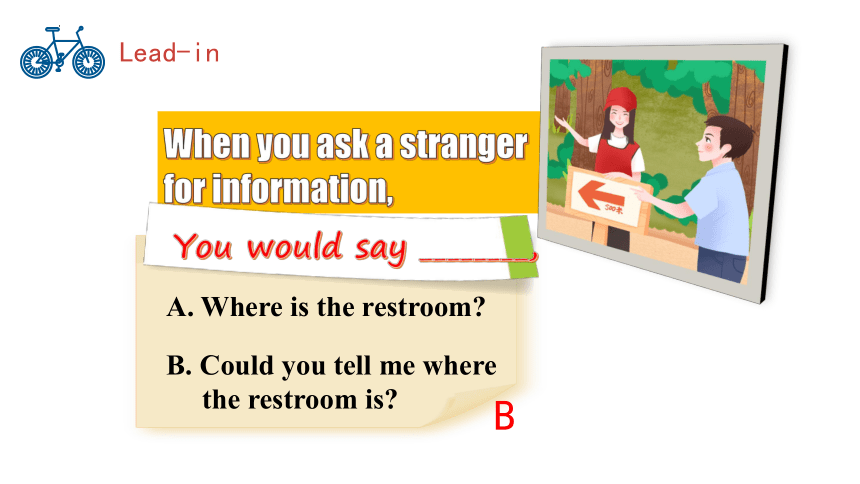
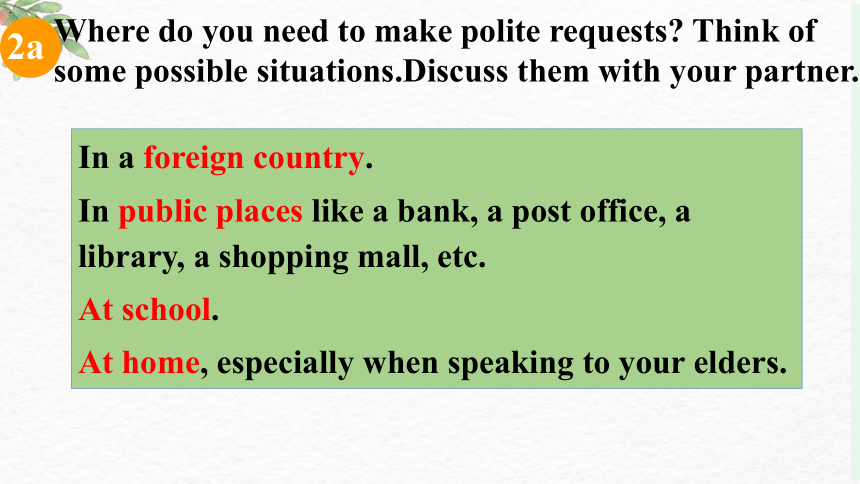
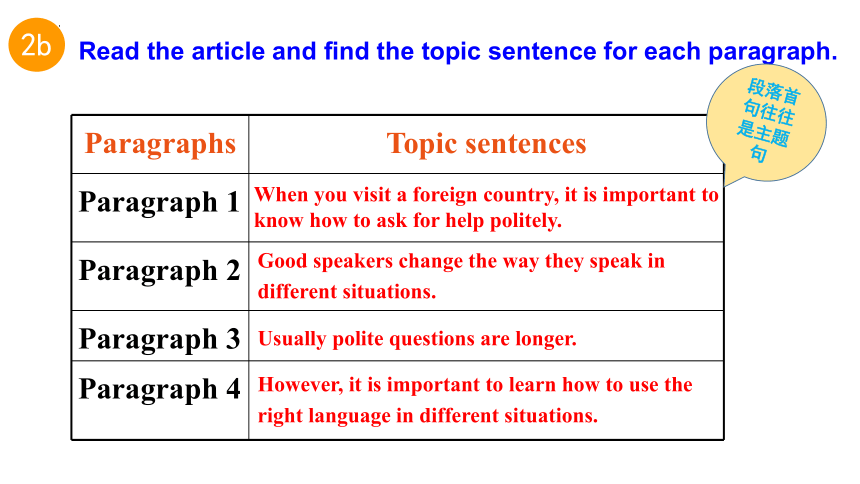
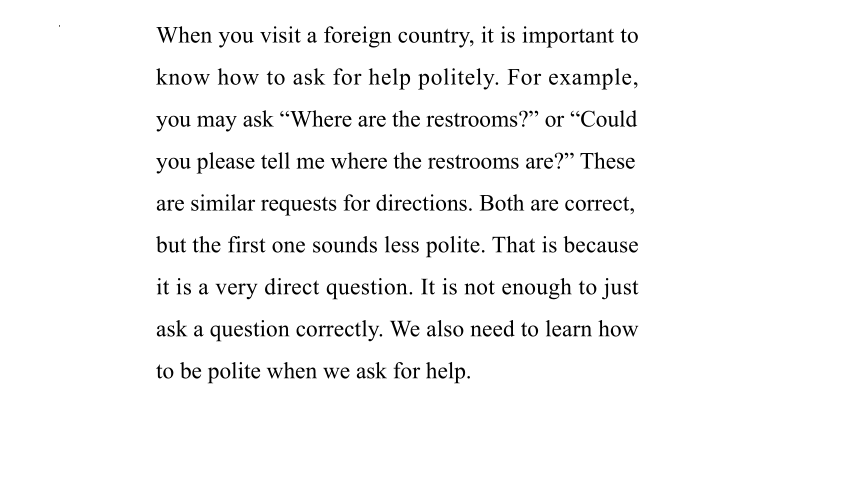

文档简介
(共26张PPT)
Unit 3
Could you please tell me
where the restrooms are
(Section B 2a-2d)
Review:
1.沿着
2.在你的右边
3.在...旁边
4.左转
5.从旁经过
6.以...开始
7.建议做某事
8.suggest名词
9.在某人去某地的路上
10.一只不昂贵的钢
11.一个做某事的好地方
12.safe-副词-名词
13.对于某人来说是便利的
1.go along
2.on your right
3.beside
4.turn left
5.go past/pass by/go by
6.begin with/start with
7.suggest doing sth/advise sb to do sth
8.suggestion
9.on one’s way to
10.an inexpensive pen
11.a good place to do sth
12 safely safety
13.It’s convenient to do sth
politely
request
direction
correct
polite
direct
adv. 礼貌地;客气地
n. & v. 要求;请求
n. 方向;方位
adj. 正确的;恰当的
adj. 有礼貌的;客气的
adj. 直接的;直率的
speaker
whom
impolite
address
underground
parking lot
n. 讲(某种语言)的人;发言者
pron. 谁;什么人
adj. 不礼貌的;粗鲁的
n. 住址;地址;通讯处
adj. 地下的 n. 地铁
停车场;停车区
When you ask a stranger
for information,
A. Where is the restroom
B. Could you tell me where
the restroom is
You would say ________,
Lead-in
B
2a
Where do you need to make polite requests Think of some possible situations.Discuss them with your partner.
In a foreign country.
In public places like a bank, a post office, a library, a shopping mall, etc.
At school.
At home, especially when speaking to your elders.
Read the article and find the topic sentence for each paragraph.
2b
Paragraphs Topic sentences
Paragraph 1
Paragraph 2
Paragraph 3
Paragraph 4
段落首句往往是主题句
When you visit a foreign country, it is important to know how to ask for help politely.
Good speakers change the way they speak in different situations.
However, it is important to learn how to use the right language in different situations.
Usually polite questions are longer.
When you visit a foreign country, it is important to know how to ask for help politely. For example, you may ask “Where are the restrooms ” or “Could you please tell me where the restrooms are ” These are similar requests for directions. Both are correct, but the first one sounds less polite. That is because it is a very direct question. It is not enough to just ask a question correctly. We also need to learn how to be polite when we ask for help.
1.When you visit a foreign country, it is important to know how to ask for help politely. 当你去国外旅游时,知道如何礼貌地寻求帮助很重要。
politely 作副词,意为“礼貌地;客气地”;其反义词为 impolitely(不礼貌地;粗鲁地);polite 是其形容词形式,反义词为 impolite(不礼貌的;粗鲁的)。
e.g. He stood up politely when the lady entered the room.
这位女士走进房间的时候,他很有礼貌地站了起来。
He is a polite child. He speaks to everyone politely.
他是一个有礼貌的孩子,他对每个人说话都很有礼貌。
1). 作形容词,“正确的”= right a correct answer
反义词: incorrect“不正确的”
副词: correctly “正确地” correct mistakes
2). 作动词,纠正
2..correct 的用法
3.direct此处用作形容词,意为“直接的;直率的”,其反义词为indirect,意为“间接的”副词为directly,意为“直接地”。
e.g.You'll have to get used to his direct manner.
Good speakers change the way they speak in different situations. The expressions they use might depend on whom they are speaking to or how well they know each other. It is all right to ask your classmates direct questions because you know them well. However, if you say to your teacher, “When is the school trip ”, this might sound impolite. But if you say, “Excuse me, Mr. West. Do you know when the school trip is ”, this will sound much more polite.
Usually polite questions are longer. They include expressions such as “Could you please ... ” or “May I ask ... ” It sounds more polite to say, “Peter, could you please tell me your e-mail address ” than “Peter, tell me your e-mail address.” Sometimes we even need to spend time leading into a request. For example, we might first say to a stranger, “Excuse me, I wonder if you can help me” or “I’m sorry to trouble you, but ...” before asking for help.
4. They include expressions such as “Could you please ... ” or “May I ask ... ”
它们包括像“Could you please ... ” 或“May I ask ... ”之类的表达方式。
include作及物动词,意为“包括;包含”。
e.g The price includes both the house and the furniture inside.
拓展
including用作介词,意为“包括;包含在内”,后接名词、代词或动词-ing形式。
Six people, including a baby, were injured in the accident.
事故中有6人受伤,其中包括一名婴儿。
5.Sometimes we even need to spend time leading in to a request. 有时,我们甚至需要花些时间来导入一个请求。
lead in to意为“引入;导人”。其中in为副词,to为
介词,其后接名词或代词作宾语。
We often use “excuse me” to lead in to a request.
我们常用“excuse me”来导入一个请求。
拓展:
6.①reply用作不及物动词,意为“回答,回复”, reply to sb./sth.表示“对某人/某事作出回答”。用作及物动词,其后可接宾语从句。
He didn’t reply to my letter.
他没有回复我的信。
②answer作及物动词,其后可直接跟名词或代词作宾语。
Please answer my question.
请回答我的问题。
7.lead to意为“导致;通向”。
Too much work and too little rest often lead to illness.
过量的工作和过少的休息经常引起疾病。
All roads lead to Rome.
条条大道通罗马。
8.I look forward to your reply. 我期待您的回复。
look forward to表示“盼望;期待”,相当于expect,特指以特别愉快的心情期待着。 其中to为介词,后面接V-ing形式。
译:我期待着再次见到你。
误:I’m looking forward to see you again.
正:I’m looking forward to seeing you again.
It might seem more difficult to speak politely than directly. However, it is important to learn how to use the right language in different situations. This will help you communicate better with other people.
9.seem adj.好像,似乎,不用于进行时和被动语态。
(1) seem +adj.
(2)seem to do sth
(3)It seems that +句子
翻译:他好像很高兴
He seems happy.
He seems to be happy.
It seems that he is happy.
词汇
·Could you please tell me ...
·Excuse me, do you know ...
·Excuse me, I wonder if you can help me.
·I’m sorry to trouble you, but ...
礼貌地提出
请求或寻求帮助
的句型
politely、request、direction、correct、polite、direct、 speaker、whom、impolite、address、underground、
parking lot
1. I don't remember ______ the book yesterday.
A. where I put
B. where did I put
C. where will I put
D. where l will put
2. They wonder _____ robots will make humans lose
their jobs or not.
A. that B. if C. whether D. what
A
C
3.He______half a year learning how to drive.
A.cost B.took C.paid D.spent
4.We should speak to the old___.
A.polite B.politely C.impolite D.impolitely
5.--Do you know____
---For a month.
A.how long will she be away
B.how long she will be away
C.how often will she go there
D.how often she will go there
D
B
B
Homework
Master the words and expressions in this class.
Preview the next part.
Thank you!
Unit 3
Could you please tell me
where the restrooms are
(Section B 2a-2d)
Review:
1.沿着
2.在你的右边
3.在...旁边
4.左转
5.从旁经过
6.以...开始
7.建议做某事
8.suggest名词
9.在某人去某地的路上
10.一只不昂贵的钢
11.一个做某事的好地方
12.safe-副词-名词
13.对于某人来说是便利的
1.go along
2.on your right
3.beside
4.turn left
5.go past/pass by/go by
6.begin with/start with
7.suggest doing sth/advise sb to do sth
8.suggestion
9.on one’s way to
10.an inexpensive pen
11.a good place to do sth
12 safely safety
13.It’s convenient to do sth
politely
request
direction
correct
polite
direct
adv. 礼貌地;客气地
n. & v. 要求;请求
n. 方向;方位
adj. 正确的;恰当的
adj. 有礼貌的;客气的
adj. 直接的;直率的
speaker
whom
impolite
address
underground
parking lot
n. 讲(某种语言)的人;发言者
pron. 谁;什么人
adj. 不礼貌的;粗鲁的
n. 住址;地址;通讯处
adj. 地下的 n. 地铁
停车场;停车区
When you ask a stranger
for information,
A. Where is the restroom
B. Could you tell me where
the restroom is
You would say ________,
Lead-in
B
2a
Where do you need to make polite requests Think of some possible situations.Discuss them with your partner.
In a foreign country.
In public places like a bank, a post office, a library, a shopping mall, etc.
At school.
At home, especially when speaking to your elders.
Read the article and find the topic sentence for each paragraph.
2b
Paragraphs Topic sentences
Paragraph 1
Paragraph 2
Paragraph 3
Paragraph 4
段落首句往往是主题句
When you visit a foreign country, it is important to know how to ask for help politely.
Good speakers change the way they speak in different situations.
However, it is important to learn how to use the right language in different situations.
Usually polite questions are longer.
When you visit a foreign country, it is important to know how to ask for help politely. For example, you may ask “Where are the restrooms ” or “Could you please tell me where the restrooms are ” These are similar requests for directions. Both are correct, but the first one sounds less polite. That is because it is a very direct question. It is not enough to just ask a question correctly. We also need to learn how to be polite when we ask for help.
1.When you visit a foreign country, it is important to know how to ask for help politely. 当你去国外旅游时,知道如何礼貌地寻求帮助很重要。
politely 作副词,意为“礼貌地;客气地”;其反义词为 impolitely(不礼貌地;粗鲁地);polite 是其形容词形式,反义词为 impolite(不礼貌的;粗鲁的)。
e.g. He stood up politely when the lady entered the room.
这位女士走进房间的时候,他很有礼貌地站了起来。
He is a polite child. He speaks to everyone politely.
他是一个有礼貌的孩子,他对每个人说话都很有礼貌。
1). 作形容词,“正确的”= right a correct answer
反义词: incorrect“不正确的”
副词: correctly “正确地” correct mistakes
2). 作动词,纠正
2..correct 的用法
3.direct此处用作形容词,意为“直接的;直率的”,其反义词为indirect,意为“间接的”副词为directly,意为“直接地”。
e.g.You'll have to get used to his direct manner.
Good speakers change the way they speak in different situations. The expressions they use might depend on whom they are speaking to or how well they know each other. It is all right to ask your classmates direct questions because you know them well. However, if you say to your teacher, “When is the school trip ”, this might sound impolite. But if you say, “Excuse me, Mr. West. Do you know when the school trip is ”, this will sound much more polite.
Usually polite questions are longer. They include expressions such as “Could you please ... ” or “May I ask ... ” It sounds more polite to say, “Peter, could you please tell me your e-mail address ” than “Peter, tell me your e-mail address.” Sometimes we even need to spend time leading into a request. For example, we might first say to a stranger, “Excuse me, I wonder if you can help me” or “I’m sorry to trouble you, but ...” before asking for help.
4. They include expressions such as “Could you please ... ” or “May I ask ... ”
它们包括像“Could you please ... ” 或“May I ask ... ”之类的表达方式。
include作及物动词,意为“包括;包含”。
e.g The price includes both the house and the furniture inside.
拓展
including用作介词,意为“包括;包含在内”,后接名词、代词或动词-ing形式。
Six people, including a baby, were injured in the accident.
事故中有6人受伤,其中包括一名婴儿。
5.Sometimes we even need to spend time leading in to a request. 有时,我们甚至需要花些时间来导入一个请求。
lead in to意为“引入;导人”。其中in为副词,to为
介词,其后接名词或代词作宾语。
We often use “excuse me” to lead in to a request.
我们常用“excuse me”来导入一个请求。
拓展:
6.①reply用作不及物动词,意为“回答,回复”, reply to sb./sth.表示“对某人/某事作出回答”。用作及物动词,其后可接宾语从句。
He didn’t reply to my letter.
他没有回复我的信。
②answer作及物动词,其后可直接跟名词或代词作宾语。
Please answer my question.
请回答我的问题。
7.lead to意为“导致;通向”。
Too much work and too little rest often lead to illness.
过量的工作和过少的休息经常引起疾病。
All roads lead to Rome.
条条大道通罗马。
8.I look forward to your reply. 我期待您的回复。
look forward to表示“盼望;期待”,相当于expect,特指以特别愉快的心情期待着。 其中to为介词,后面接V-ing形式。
译:我期待着再次见到你。
误:I’m looking forward to see you again.
正:I’m looking forward to seeing you again.
It might seem more difficult to speak politely than directly. However, it is important to learn how to use the right language in different situations. This will help you communicate better with other people.
9.seem adj.好像,似乎,不用于进行时和被动语态。
(1) seem +adj.
(2)seem to do sth
(3)It seems that +句子
翻译:他好像很高兴
He seems happy.
He seems to be happy.
It seems that he is happy.
词汇
·Could you please tell me ...
·Excuse me, do you know ...
·Excuse me, I wonder if you can help me.
·I’m sorry to trouble you, but ...
礼貌地提出
请求或寻求帮助
的句型
politely、request、direction、correct、polite、direct、 speaker、whom、impolite、address、underground、
parking lot
1. I don't remember ______ the book yesterday.
A. where I put
B. where did I put
C. where will I put
D. where l will put
2. They wonder _____ robots will make humans lose
their jobs or not.
A. that B. if C. whether D. what
A
C
3.He______half a year learning how to drive.
A.cost B.took C.paid D.spent
4.We should speak to the old___.
A.polite B.politely C.impolite D.impolitely
5.--Do you know____
---For a month.
A.how long will she be away
B.how long she will be away
C.how often will she go there
D.how often she will go there
D
B
B
Homework
Master the words and expressions in this class.
Preview the next part.
Thank you!
同课章节目录
- Unit 1 How can we become good learners.
- Section A
- Section B
- Unit 2 I think that mooncakes are delicious!
- Section A
- Section B
- Unit 3 Could you please tell me where the restroom
- Section A
- Section B
- Unit 4 I used to be afraid of the dark.
- Section A
- Section B
- Unit 5 What are the shirts made of?
- Section A
- Section B
- Review of Units 1-5
- Unit 6 When was it invented?
- Section A
- Section B
- Unit 7 Teenagers should be allowed to choose their
- Section A
- Section B
- Unit 8 It must belong to Carla.
- Section A
- Section B
- Unit 9 I like music that I can dance to.
- Section A
- Section B
- Unit 10 You're supposed to shake hands.
- Section A
- Section B
- Review of Units 6-10
- Unit 11 Sad movies make me cry.
- Section A
- Section B
- Unit 12 Life is full of the unexpected
- Section A
- Section B
- Unit 13 We're trying to save the earth!
- Section A
- Section B
- Unit 14 I remember meeting all of you in Grade 7.
- Section A
- Section B
- Review of Units 11-14
